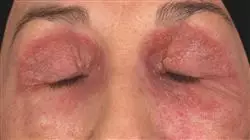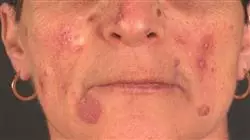University certificate
The world's largest faculty of medicine”
Description
Improve your knowledge in connective tissue diseases through this program, where you will find the best teaching material with real clinical cases and high resolution images. Learn here about the latest advances in the specialty to be able to perform a quality medical practice”

Connective tissue diseases constitute a heterogeneous group of systemic inflammatory diseases of autoimmune etiology including lupus erythematosus, scleroderma, dermatomyositis or mixed connective tissue disease, with variable symptoms and signs that may appear simultaneously or insidiously over the course of weeks or months.
In many cases, the affects on the skin can be incapacitating and markedly worsen the quality of life of patients.
The aim of this course is to help specialists gain up-to-date knowledge in the approach to the main connected tissue diseases which will, without a doubt, help them in making decisions that will improve the care and the prognosis off the patients.
Update your knowledge through the postgraduate certificate in Dermatological Pathology: Connected Tissue Diseases in a practical way, adapted to your needs”
This postgraduate certificate in Dermatological Pathology: Connected Tissue Diseases contains the most complete and up-to-date scientific program on the market" The most important features of the course are:
- Clinical cases presented by experts in the different specialties. The graphic, schematic, and eminently practical contents with which they are created contain clinical information that is indispensable for professional practice
- Diagnostic and therapeutic innovations in the approach to connective tissue diseases
- It contains practical exercises where the self-evaluation process can be carried out to improve learning
- Algorithm-based interactive learning system for decision-making in the presented clinical situations
- Special emphasis on test-based medicine and research methodologies in dermatology
- All of this will be complemented by theoretical lessons, questions to the expert, debate forums on controversial topics, and individual reflection assignments
- Content that is accessible from any fixed or portable device with an Internet connection
This postgraduate certificate may be the best investment you can make when choosing a refresher program for two reasons: in addition to updating your knowledge in connective tissue diseases, you will obtain a postgraduate certificate qualification from TECH Global University”
Forming part of the teaching staff is a group of professionals in the world of dermatology, who bring to this course their work experience, as well as a group of renowned specialists, recognised by esteemed scientific communities.
The multimedia content developed with the latest educational technology will provide the professional with situated and contextual learning, i.e., a simulated environment that will provide an immersive training program to train in real situations.
This program is designed around Problem Based Learning, whereby the physician must try to solve the different professional practice situations that arise during the course. For this reason, you will be assisted by an innovative, interactive video system created by renowned and experienced experts in the field of dermatology with extensive teaching experience.
The postgraduate certificate allows training in simulated environments, which provide immersive learning programmed to train in real situations"

It includes clinical cases to bring the program's degree as close as possible to the reality of medical care"
Objectives
The main objective of this program is to help the medic so that, in a simple way, they can update their knowledge of the advances in the management of connective tissue diseases, so that the specialist’s knowledge is kept up-to-date and they can perform an appropriate diagnosis and choose the best treatment, allowing them to carry out their professional practice with confidence.

This refresher program will generate a sense of confidence in your medical practice, which will help you grow both personally and professionally”
General Objective
- Provide the specialist with up-to-date knowledge of the approach to the most common dermatological lesions and describe the applications of the most advanced diagnostic and therapeutic techniques
Specific Objectives
- List the different clinical forms of cutaneous lupus erythematosus and their morphology
- Describe the relationship between the different forms of cutaneous and systemic lupus
- List the main complementary examinations that must be carried out on patients affected by cutaneous lupus erythematosus
- List the treatments of cutaneous lupus erythematosus
- Recognize the cutaneous manifestations of systemic sclerosis
- List the diagnostic criteria for diffuse and limited systemic sclerosis
- Recognize the cutaneous manifestations of dermatomyositis
- List the diagnostic criteria of dermatomyositis
- List the peculiarities of infantile, paraneoplastic and sine myositis dermatomyositis
- List the complementary examinations to carry out on a patient with dermatomyositis
- Describe the treatment of dermatomyositis
- Establish differential diagnosis of mixed connective tissue disease with the rest of the connective tissue diseases

Make the most of the opportunity and take the step to get up to date on the latest developments in the management of connective tissue diseases"
Postgraduate Certificate in Dermatologic Pathology: Connectivopathologies
Connectivopathies are a group of autoimmune diseases that primarily affect the connective tissues of the body, including the skin. The understanding and proper management of these pathologies are essential for dermatology professionals. In our Postgraduate Certificate in Dermatologic Pathology, we focus on connective tissue diseases and provide participants with the knowledge necessary for the diagnosis and treatment of these conditions.
This Postgraduate Certificate provides a comprehensive overview of the most common connective tissue diseases, including systemic lupus erythematosus, scleroderma and dermatomyositis. Participants will learn about the diagnostic criteria, characteristic skin manifestations and treatment options available for each disease. In addition, topics such as the pathophysiology of connective tissue diseases, laboratory tests used in diagnosis and the latest research in the field will be addressed.







